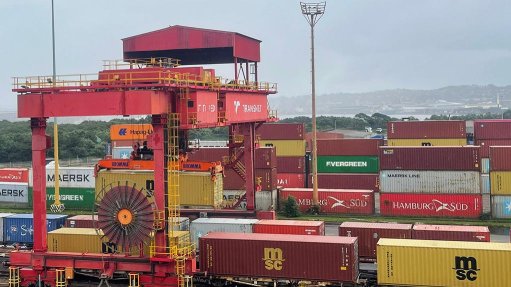Africa should embrace smart, advanced manufacturing to add greater value
Africa contributes about 2% of global GDP, but provides about 30% of global raw materials. However, if African manufacturers focus on adopting modern manufacturing technologies and creating smart factories, then much greater value can be added by local industry.
When looking at manufacturing value-add by region, developed regions such as the EU and North America, and developed nations such as Australia and New Zealand, have a very large component of manufacturing value added to their GDP, manufacturing executive development nonprofit Toyota Wessels Institute for Manufacturing Studies (TWIMS) executive director Professor Theuns Pelser has said.
"Complex manufacturing requires diverse industries and ecosystems involved in making the high-value products. Only producing raw materials or semi-processed goods removes the need for complexity and the industry then does not need further skills, which leads to a decline in value addition in manufacturing," he said on the second day of the Manufacturing Enterprise Solutions Association (MESA) Africa 2024 Summit, in Sandton, Gauteng, on October 17.
He added that sub-Saharan Africa could view this as an opportunity to leapfrog, through the creation of smart factories, to get to the developed world's manufacturing value-add trajectory.
Companies in the fast-paced and globalised world need to adopt technologies to enhance their competitiveness.
Key to this technology drive was to determine how the application of technologies would benefit individuals and organisations, and how the combination of technologies could create a smart factory, he emphasised.
He gave six examples of how companies can drive advanced manufacturing and how these technologies would benefit organisations, such as additive manufacturing providing companies with new scope to customise their products, while Industrial Internet of Things sensor networks and analytics can help to prevent machines from breaking down and leading to stoppages.
Further, he highlighted that digitalisation of older equipment and factories could make factories smart.
For example, UK beet sugar products manufacturer British Sugar, which has traditional processes and old-fashioned boilers, uses sensors on critical equipment to prevent breakdowns and manage its processes across the diverse range of products it produces.
However, while technologies could benefit organisations, companies should be more concerned about using technology to drive things such as local production, product customisation and resource efficiency, he emphasised.
"There are lots of inefficiencies in African manufacturing in terms of resource use, and it is critical to consider how smart factories can increase resource efficiency in organisations.
"South Africa is on a downward path in terms of the complexity of products that we are exporting, and is deindustrialising. To overcome this, we need to make manufacturing 'sexy' and attract new talent into new careers in industries to create more complex industrial ecosystems," said Pelser.
Africa, for example, manufactures only 4% of the materials and parts for the automotive value chain used around the world. Therefore, there is scope to increase this by establishing smart factories, which will enable manufacturers in the supply chain to move up from being basic materials suppliers to Tier 2 and then Tier 1 suppliers.
To create Tier 2 and Tier 1 manufacturers, growth is required in skills so that technologies can be used to produce these more complex goods for customers.
"[South Africa] should move away from Tier 3 manufacturing, which is where we only get punched. For example, owing to the carbon intensity of our manufacturing, such as steel or aluminium production that relies on coal-fired power, we are at a problematic disadvantage in terms of EU and North American markets," he said.
Smart manufacturing helped to reduce carbon footprints and boosted efficiencies across a range of resources, processes and products, benefitting the bottom line of companies and the value of the industry, he added.
"A core challenge is that companies cannot effectively use technologies without upskilling people. People also need to be provided the relevant context and reasons for technology deployments so that they understand how they will benefit from them," said Pelser.
There are also concerns that smart factories will lead to people losing jobs, but an illustrative data point is that, by 2030, 230-million jobs in Africa will require at least some level of digital skills.
"The opportunity lies in adopting and using smart manufacturing technologies intensively to benefit organisations and individuals in factories.
"Smart factories can also be flexible, and some can be turned around in six months to produce different products. The benefits from this, and an edge that African manufacturers can gain, is that smart factories can ride out volatility in the market by quickly adapting.
"By creating smart factories, South Africa and other developing countries can move towards more complex manufacturing, which is where the greatest value is added."
Article Enquiry
Email Article
Save Article
Feedback
To advertise email advertising@creamermedia.co.za or click here
Press Office
Announcements
What's On
Subscribe to improve your user experience...
Option 1 (equivalent of R125 a month):
Receive a weekly copy of Creamer Media's Engineering News & Mining Weekly magazine
(print copy for those in South Africa and e-magazine for those outside of South Africa)
Receive daily email newsletters
Access to full search results
Access archive of magazine back copies
Access to Projects in Progress
Access to ONE Research Report of your choice in PDF format
Option 2 (equivalent of R375 a month):
All benefits from Option 1
PLUS
Access to Creamer Media's Research Channel Africa for ALL Research Reports, in PDF format, on various industrial and mining sectors
including Electricity; Water; Energy Transition; Hydrogen; Roads, Rail and Ports; Coal; Gold; Platinum; Battery Metals; etc.
Already a subscriber?
Forgotten your password?
Receive weekly copy of Creamer Media's Engineering News & Mining Weekly magazine (print copy for those in South Africa and e-magazine for those outside of South Africa)
➕
Recieve daily email newsletters
➕
Access to full search results
➕
Access archive of magazine back copies
➕
Access to Projects in Progress
➕
Access to ONE Research Report of your choice in PDF format
RESEARCH CHANNEL AFRICA
R4500 (equivalent of R375 a month)
SUBSCRIBEAll benefits from Option 1
➕
Access to Creamer Media's Research Channel Africa for ALL Research Reports on various industrial and mining sectors, in PDF format, including on:
Electricity
➕
Water
➕
Energy Transition
➕
Hydrogen
➕
Roads, Rail and Ports
➕
Coal
➕
Gold
➕
Platinum
➕
Battery Metals
➕
etc.
Receive all benefits from Option 1 or Option 2 delivered to numerous people at your company
➕
Multiple User names and Passwords for simultaneous log-ins
➕
Intranet integration access to all in your organisation

















